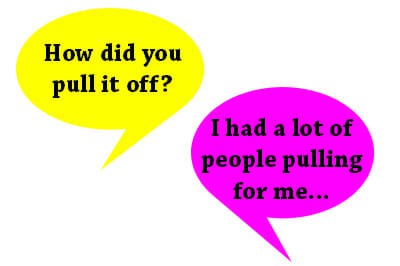What are Phrasal Verbs?
Phrasal verbs are two- or three-word combinations of a verb + preposition, like take up, take in, take out, take off, take away, take over, and take back.
These are examples of phrasal verbs… and they ALL have different meanings! This can be really frustrating because using the wrong phrasal verb can change the whole sentence.
And what’s worse is that each phrasal verb can have multiple definitions. For example, TAKE OFF can mean:
- When an airplane leaves the ground
- To remove (ex. “take off your shoes”)
- Make great progress (“sales have really taken off lately”)
- Informal: To leave (“I’m gonna take off, I’ll see you guys later!”)
Phrasal verbs can make it difficult to understand spoken English… even if you’ve studied for a long time.
I had a student who was at the upper-intermediate level, and his English was really quite good. But he traveled to Canada – it was the first time he had ever visited an English-speaking country.
And when he came back, he told me he had a LOT of difficulty understanding the spoken English in Canada, and it was all because of the phrasal verbs, which are SO common in spoken English.

Phrasal verbs can make it difficult to understand when you talk with native speakers.
The problem is that regular textbooks don’t focus on phrasal verbs, and they’re also not used in more formal English like articles and news broadcasts.
But if you want to be fluent in English – especially spoken English – you NEED to know them and how they are used in everyday situations and conversations.
So what’s the best way to learn phrasal verbs? Some students get a list or dictionary of phrasal verbs and start trying to memorize them.
But that’s boring, and it’s not very effective. First of all, there are thousands of phrasal verbs in English, so it’s going to be hard to memorize them all.

Trying to memorize long lists is NOT the best way!
Second, memorizing lists just causes more confusion because the words are all so similar. There are 37 different phrasal verbs just with the word “come”: come about, come across, come along, come around, come by, come through, come over. How are you supposed to remember each one?
How do native English speakers
learn phrasal verbs?
Let’s look at how native English speakers learn phrasal verbs – here’s a very simple example.
Imagine that every morning when I was a child, my mother said to me, “Shayna, time to get up!” – then I learn from the situation that “get up” means “leave the bed in the morning,” and I will naturally use it in this way when I speak. I learned the phrasal verb naturally in context.

In an English-speaking country, I learn the phrasal verb “get up” naturally, in context.
Or another example: if I’m in school and the teacher says she’s going to hand out worksheets to all the students, what does hand out mean? It means “to distribute.” Again, I learn the meaning of the phrasal verb naturally in context – no need to memorize words from a big list.
But how can you learn phrasal verbs naturally
if you don’t live in an English-speaking country?
Wouldn’t it be great if there was a book or course that taught you phrasal verbs – not through a list or a dictionary – but by seeing them used naturally in conversations?
That’s why I’ve created the Phrasal Verbs in Conversation Course! It will teach you phrasal verbs in a fun, natural, interesting way that will help you remember them better and use them in your English more easily.
Let me show you how the course works.
1) Read & Listen to the Conversation
At the beginning of each lesson, you’ll hear a short conversation using a number of phrasal verbs related to a specific topic – like sports, relationships, work, news, etc. This is great for you to practice your listening.
Each lesson starts with a dialogue that’s full of phrasal verbs.
2) Watch the Explanation to Learn the Phrasal Verbs
Then, there’s a video explanation that teaches you all the phrasal verbs from the dialogue, explaining what they mean and giving further examples. The text from the video is also available.
Watch/read the explanation to learn the phrasal verbs from the conversation
3) Do the Exercises to Practice the Phrasal Verbs
Finally, each lesson has both a phrasal verbs quiz to help you practice, and writing exercises to help you use the phrasal verbs in your own sentences immediately.
This is very important so that you don’t just “know” the words, but you begin to USE them actively in your own English. You can also send me your writing for correction.
Resolva exercícios e atividades acadêmicas
Phrasal Verbs in Conversation Lesson List

Lesson 1 – Phrasal Verbs for Romantic Relationships
Listen to a conversation between Emily and Sarah about their love lives, and learn 16 phrasal verbs about romantic relationships.
 Lesson 2 – Phrasal Verbs for Emotions
Lesson 2 – Phrasal Verbs for Emotions
Jane has a terrible day at work, and Matt gives her some advice for handling difficult co-workers. You’ll learn 17 phrasal verbs about emotions from their conversation.
Lesson 3 – Phrasal Verbs for Social Situations
 Erin and Rachel chat about a party that Rachel didn’t go to – using 19 phrasal verbs for social situations.
Erin and Rachel chat about a party that Rachel didn’t go to – using 19 phrasal verbs for social situations.
Encontre o professor particular perfeito
Lesson 4 – Phrasal Verbs Around the House
 Mary asks Joanna if she can stay at her house, but there are a few problems with her arrival. Here are 19 more phrasal verbs for actions around the house.
Mary asks Joanna if she can stay at her house, but there are a few problems with her arrival. Here are 19 more phrasal verbs for actions around the house.
Lesson 5 – Phrasal Verbs for Health & Sports
 Christine invites Pamela to join her at the gym, but Pamela is sick. They discuss health and fitness habits using 17 new phrasal verbs.
Christine invites Pamela to join her at the gym, but Pamela is sick. They discuss health and fitness habits using 17 new phrasal verbs.
Lesson 6 – Phrasal Verbs for School & Studying
 Carla and Shirley talk about essays, tests, and a difficult college course – with 22 phrasal verbs.
Carla and Shirley talk about essays, tests, and a difficult college course – with 22 phrasal verbs.
Lesson 7 – Phrasal Verbs for Driving
 Cathy tells Laura about a terrible road trip she took with her husband, in which everything that could go wrong, does go wrong. You’ll learn 20 phrasal verbs from this story.
Cathy tells Laura about a terrible road trip she took with her husband, in which everything that could go wrong, does go wrong. You’ll learn 20 phrasal verbs from this story.
Lesson 8 – Phrasal Verbs about Money
 Diane and Amy chat about financial matters, using 20 phrasal verbs about money. If you don’t know what “chip in,” “splurge on,” and “cough up” mean, take a look at this lesson!
Diane and Amy chat about financial matters, using 20 phrasal verbs about money. If you don’t know what “chip in,” “splurge on,” and “cough up” mean, take a look at this lesson!
Lesson 9 – Phrasal Verbs at Work
 Wendy and Martha need to find an emergency replacement for one of their colleagues – but everyone is overworked. Learn how they resolve this problem with 20 new phrasal verbs.
Wendy and Martha need to find an emergency replacement for one of their colleagues – but everyone is overworked. Learn how they resolve this problem with 20 new phrasal verbs.
Lesson 10 – Phrasal Verbs for Computers
 Julia helps her mother with a few computer problems, using 16 phrasal verbs in the process.
Julia helps her mother with a few computer problems, using 16 phrasal verbs in the process.
Lesson 11 – Phrasal Verbs for Travel
 Pamela arrives in New York and explores the city while she stays with her friend Heather. You’ll learn 14 new phrasal verbs from their conversation.
Pamela arrives in New York and explores the city while she stays with her friend Heather. You’ll learn 14 new phrasal verbs from their conversation.
Lesson 12 – Phrasal Verbs for Communication
 Vanessa tells Leslie about an embarrassing situation, using phrasal verbs like “harp on,” “rant about,” “tune out,” and 17 more.
Vanessa tells Leslie about an embarrassing situation, using phrasal verbs like “harp on,” “rant about,” “tune out,” and 17 more.
Lesson 13 – Phrasal Verbs for Time & Change (Part 1)
 Miriam tells Jenni about a change in plans and gives her some advice in dealing with her kids – using 19 phrasal verbs related to time and change.
Miriam tells Jenni about a change in plans and gives her some advice in dealing with her kids – using 19 phrasal verbs related to time and change.
Lesson 14 – Phrasal Verbs for Time & Change (Part 2)
 Natalie tells Tina about a roller-coaster year in the life of her company, using 15 more phrasal verbs about time and change.
Natalie tells Tina about a roller-coaster year in the life of her company, using 15 more phrasal verbs about time and change.
Lesson 15 – Phrasal Verbs for Persuading & Deciding
 Carrie and Michelle chat about the difficult decisions that need to be made when remodeling a house. You’ll learn 18 new phrasal verbs from their conversation.
Carrie and Michelle chat about the difficult decisions that need to be made when remodeling a house. You’ll learn 18 new phrasal verbs from their conversation.
Lesson 16 – Phrasal Verbs About the Weather
 Ashley calls Beth during a storm and they chat about the terrible weather, using 15 phrasal verbs.
Ashley calls Beth during a storm and they chat about the terrible weather, using 15 phrasal verbs.
Lesson 17 – Phrasal Verbs in the News
 Erica and Jasmine talk about recent news, the violence in the city, and the upcoming elections, using 20 phrasal verbs.
Erica and Jasmine talk about recent news, the violence in the city, and the upcoming elections, using 20 phrasal verbs.
Lesson 18 – Phrasal Verbs for Movement
 Martha tells Helen how she injured her back, and Helen describes an interesting trip to the zoo – with 14 phrasal verbs involving movement.
Martha tells Helen how she injured her back, and Helen describes an interesting trip to the zoo – with 14 phrasal verbs involving movement.
Lesson 19 – Phrasal Verbs for Information
 Samantha and Kate discuss a really confusing report, trying to figure out the inaccuracies in the data and using 16 phrasal verbs related to information.
Samantha and Kate discuss a really confusing report, trying to figure out the inaccuracies in the data and using 16 phrasal verbs related to information.
Lesson 20 – Phrasal Verbs for Events
 Gina talks about a disappointing movie, and Liz describes a successful music festival. You’ll learn 15 phrasal verbs related to events from their conversation.
Gina talks about a disappointing movie, and Liz describes a successful music festival. You’ll learn 15 phrasal verbs related to events from their conversation.
Lesson 21 – Phrasal Verbs for Manners/Etiquette
 Karen and Susan exchange stories about coworkers who are rude to others in the office, and the reasons for their bad behavior. Listen in and learn 17 new phrasal verbs.
Karen and Susan exchange stories about coworkers who are rude to others in the office, and the reasons for their bad behavior. Listen in and learn 17 new phrasal verbs.
Lesson 22 – Phrasal Verbs for Destruction & Repair
 Carmen and Tara talk about fighting the city’s plans to demolish the last remaining historical building in their town, using 14 phrasal verbs related to destruction and repair.
Carmen and Tara talk about fighting the city’s plans to demolish the last remaining historical building in their town, using 14 phrasal verbs related to destruction and repair.
Lesson 23 – Phrasal Verbs with AWAY
 For the last week of the course, you’re going to learn extra phrasal verbs that didn’t quite fit into the other categories. I’ve grouped them by preposition, so in this lesson you’ll learn 10 phrasal verbs with AWAY.
For the last week of the course, you’re going to learn extra phrasal verbs that didn’t quite fit into the other categories. I’ve grouped them by preposition, so in this lesson you’ll learn 10 phrasal verbs with AWAY.
Lesson 24 – Phrasal Verbs with DOWN
 For the last week of the course, you’re going to learn extra phrasal verbs that didn’t quite fit into the other categories. I’ve grouped them by preposition, so in this lesson you’ll learn 10 phrasal verbs with DOWN.
For the last week of the course, you’re going to learn extra phrasal verbs that didn’t quite fit into the other categories. I’ve grouped them by preposition, so in this lesson you’ll learn 10 phrasal verbs with DOWN.
Lesson 25 – Phrasal Verbs with ON and IN
 For the last week of the course, you’re going to learn extra phrasal verbs that didn’t quite fit into the other categories. I’ve grouped them by preposition, so in this lesson you’ll learn 10 phrasal verbs with ON and IN.
For the last week of the course, you’re going to learn extra phrasal verbs that didn’t quite fit into the other categories. I’ve grouped them by preposition, so in this lesson you’ll learn 10 phrasal verbs with ON and IN.
Lesson 26 – Phrasal Verbs with OUT
 For the last week of the course, you’re going to learn extra phrasal verbs that didn’t quite fit into the other categories. I’ve grouped them by preposition, so in this lesson you’ll learn 10 phrasal verbs with OUT.
For the last week of the course, you’re going to learn extra phrasal verbs that didn’t quite fit into the other categories. I’ve grouped them by preposition, so in this lesson you’ll learn 10 phrasal verbs with OUT.
Lesson 27 – Phrasal Verbs with OFF
 For the last week of the course, you’re going to learn extra phrasal verbs that didn’t quite fit into the other categories. I’ve grouped them by preposition, so in this lesson you’ll learn 10 phrasal verbs with OFF.
For the last week of the course, you’re going to learn extra phrasal verbs that didn’t quite fit into the other categories. I’ve grouped them by preposition, so in this lesson you’ll learn 10 phrasal verbs with OFF.
Lesson 28 – Phrasal Verbs with UP
 For the last week of the course, you’re going to learn extra phrasal verbs that didn’t quite fit into the other categories. I’ve grouped them by preposition, so in this lesson you’ll learn 10 phrasal verbs with UP.
For the last week of the course, you’re going to learn extra phrasal verbs that didn’t quite fit into the other categories. I’ve grouped them by preposition, so in this lesson you’ll learn 10 phrasal verbs with UP.
Lesson 29 – Confusing Pairs of Phrasal Verbs
 In this lesson, we’re going to review the differences between some commonly confused phrasal verbs. For example, you learned in a past lesson that both find out and figure out mean to discover information… but you “find out” information from another source, and you “figure out” something by using your own thought and logic.
In this lesson, we’re going to review the differences between some commonly confused phrasal verbs. For example, you learned in a past lesson that both find out and figure out mean to discover information… but you “find out” information from another source, and you “figure out” something by using your own thought and logic.
Lesson 30 – Phrasal Verbs as Nouns
 During this course, you’ve seen a few phrasal verbs that have both a noun and a verb form. One example is “work out” meaning “to do exercise.” The noun form, “workout” means one session of exercise. Here are 16 more phrasal verbs that are commonly used as nouns.
During this course, you’ve seen a few phrasal verbs that have both a noun and a verb form. One example is “work out” meaning “to do exercise.” The noun form, “workout” means one session of exercise. Here are 16 more phrasal verbs that are commonly used as nouns.






